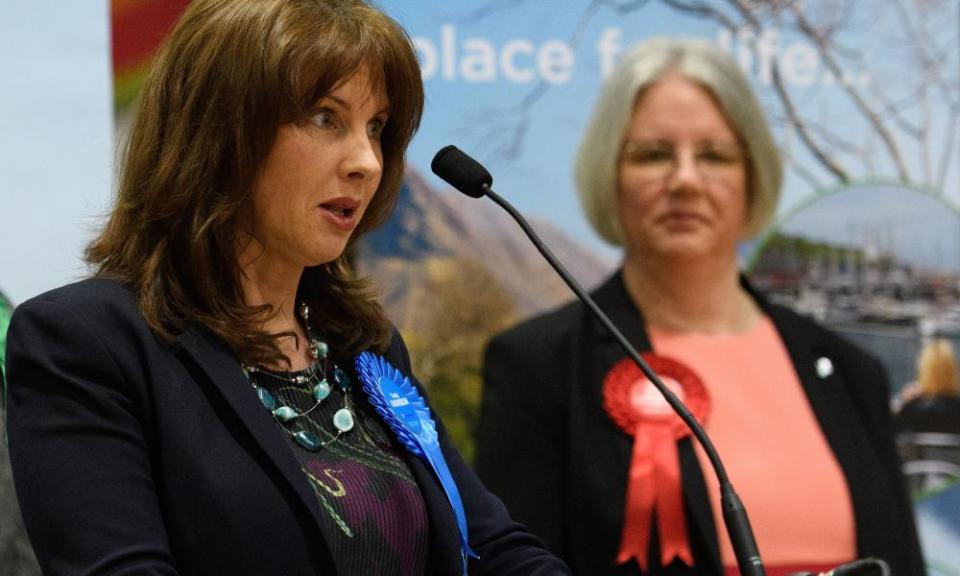Corbyn’s anti-cuts message falls flat again as Tories take Copeland

Jeremy Corbyn will come out swinging on Friday morning and deliver a punchy speech about Theresa May’s plans for a “bargain basement” Brexit, if the extracts released overnight are anything to go by.
But Thursday night’s byelection result in Copeland, Cumbria, where Labour lost to the Conservatives despite focusing on NHS cuts in an area where the future of the local hospital is under threat, was catastrophic and the Labour leader could be forced to react to the historic loss.
Putting up a stronger fight against Tory cuts has been the centrepiece of Corbyn’s remaking of Labour; yet that approach does not appear to have resonated in the Cumbrian seat, which has not been Conservative since 1935. But as Corbyn himself said, “our message was not enough to win through”.
Labour’s firm hold on the Stoke-on-Trent Central seat vacated by Tristram Hunt, with 37% of the vote, will be some comfort at party headquarters. But all three other main parties – Ukip, the Tories and the Liberal Democrats – increased their share at the cost of the party even after damaging scandals for Paul Nuttall.
Governments aren’t supposed to gain at byelections. They’re a moment in the electoral limelight, when the voters of a single constituency – or two in this case – who know full well they’re not picking a government or a prime minister, can give the residents of Downing Street a public kick up the backside.
As senior Tories in Copeland were gleefully pointing out last night, taking the seat marked just the third time the Conservatives have unseated an opposition MP at a byelection since the second world war, and the only occasion with an increased share of the vote.
And even Corbyn’s fiercest critics in his own party concede that it is not just about leadership, but a more structural challenge for Labour. Brexit appears to have shaken up Britain’s electoral geography – or perhaps crystallised changes that were already under way.
The campaign, and the subsequent debate, with its central focus on immigration, could not have been better chosen to drive a wedge between the liberal wing of the party and its more traditional, more socially conservative working-class voters – what Andy Burnham called “Hampstead and Hull”.
In the fiercely pro-remain seat of Richmond Park last year, the Liberal Democrats piled up votes as the anti-Brexit resistance party. But in Copeland, voters who had never backed the Tories broke with that taboo and threw their weight behind Theresa May.
The swing to the Conservatives, of 6.69%, if replicated across the country at a general election, would wipe out more than 50 Labour seats, many of them deep into traditional Labour territory across the Midlands and the north.
When Diane Abbott explained why she had backed the government’s article 50 bill recently despite profound concerns about the risks of Brexit, she said some Labour polling suggested the party could face an electoral collapse in the north comparable to what it suffered after the Scottish referendum, if it was seen to “block Brexit”.
These results raise questions about whether that could still happen, with the Tories, not Ukip, as the threat to Labour across its heartlands.
May has made a deliberate bid to recast the Conservatives as the “workers’ party”, chucking out David Cameron’s “chumocracy” and appointing a party chairman, Patrick McLoughlin, who, as she proudly pointed out to the House of Commons, grew up in a council house. She has tasked him with winning over working-class Labour voters; and he appears to have made a good start.
Nuttall’s problem, even aside from his awkward relationship with the truth, appears to be that the Tories have stolen his clothes. If the voters are getting Brexit – and not just any Brexit, but a “red, white and blue” one – what is his party for?
If May fails in her bid to get Brexit neatly wrapped up before the next general election, Ukip may yet be able to win over voters who feel betrayed: contrary to some predictions, the purple party was not beaten into third place in Stoke-on-Trent Central.
And if the economic cost of Brexit starts to be felt, her honeymoon may not last. But for the moment, the Conservatives appear to be in an electoral sweet spot; and Labour has no riposte.

 Yahoo News
Yahoo News 